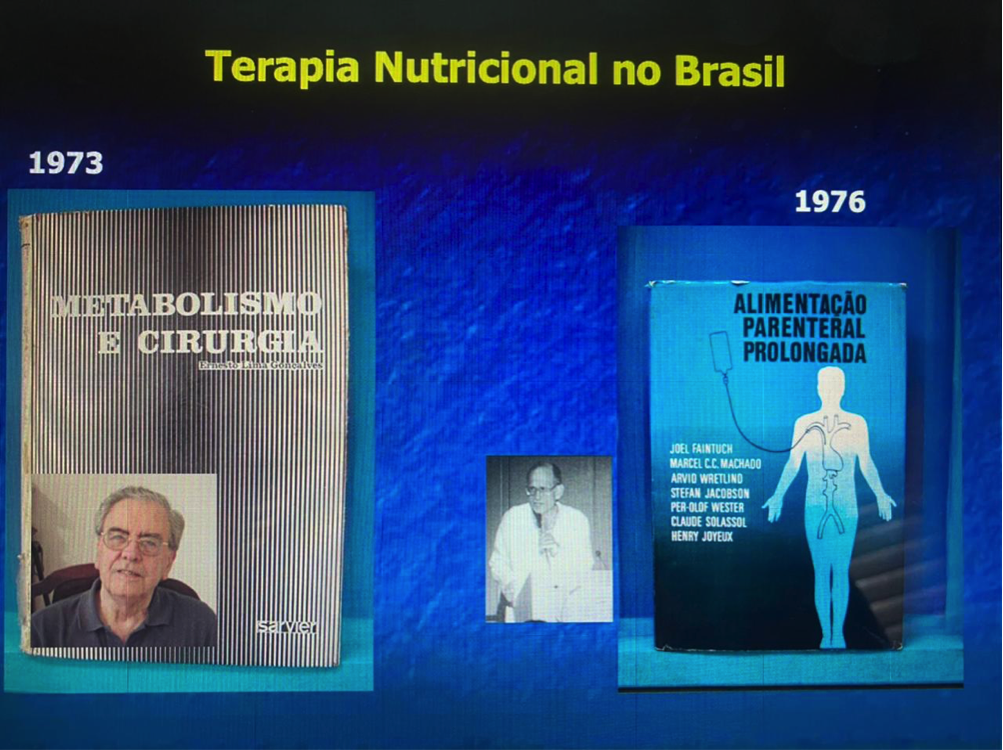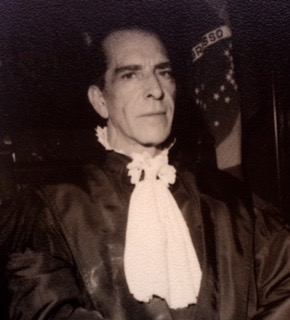Faintuch, o maior orgulho acadêmico da 52ª, por Anita Leme da Rocha Saldanha

Joel, outro dia por acaso, um pessoal muito amigo meu ficou sabendo que fomos classmates.
“O Joel, o Joel Faintuch mesmo? O da parenteral?
Ele é o máximo! Prescreveu a 1ª nutrição parenteral no Brasil; foi orientador da tese de mestrado da Dra Manuela Sapucahy em 2002, defendida num auditório da FMUSP com a presença do Dr Antonio Ermírio de Moraes.
O Joel tem 546 publicações incluindo as internacionais”
==============================================================================================================
Para sua recordação, Joel, aqui vão uns pedacinhos da sua Vida Gloriosa.
Impressiona bastante o pioneirismo do prof. Joel Faintuch, ainda muito jovem, quando usou pela primeira vez no Brasil a Nutrição Parenteral (NP) em uma paciente com fistula intestinal (1971), colocando a disciplina de Cirurgia do Aparelho Digestivo do HC-FMUSP em posição de liderança em nutrologia e no preparo da NP (farmacêutico Victor Hugo).
Isso aconteceu apenas três anos após Dudrick ter usado em um bebe com atresia intestinal, primeiro caso no mundo.
Em 1976, publica o primeiro livro brasileiro sobre o tema, intitulado “Alimentação Parenteral Prolongada”.
Fez toda a carreira acadêmica na mesma Universidade: mestrado, doutorado, livre docência, pós-doutorado na Holanda, onde permanece como professor Associado.
Possui mais de 500 publicações, incluindo anais de congressos, periódicos nacionais e internacionais, capítulos de livros, e vários livros editados.
Orientou mais de 20 teses, incluindo a Dra Manuela Sapucahy, que você pode ver de perto sua habilidade com a cirurgia laparoscópica e retirada de baços de 2kg em doentes hematológicos, sem nunca transfundir esses pacientes plaquetopênicos .
Ao longo da sua carreira seguiu na trilha da Nutrição cirúrgica a abraçou, também, a obesidade mórbida, cirurgia bariátrica, microbioma, metaboloma e medicina de precisão.
Convivemos também com um contemporâneo dele, e também expoente da nutrologia no Brasil, que foi o Dr Dan Waitzberg e a Dra Lourdes Teixeira da Silva, no Ganep, e pude ver o crescimento dessa especialidade no Brasil e no mundo.

Joel, eu perguntei ao Berger sobre o seu dia a dia atual; ele me disse que nada mudou; que você escreve, produz, publica como sempre, na velocidade de sempre.
Ele disse : “O Faintuch é o maior orgulho acadêmico da 52ª!”
Nossa turma cresceu com você, Joel.
APÊNDICE
Achei sua biografia em inglês, Joel, e aqui posto também:
“Joel Faintuch, MD, PhD, is known in South America as the father of clinical nutrition.
In Brazil in 1976, he authored one of the first books on parenteral and enteral nutrition. It was promptly adopted and utilized in Brazil, as well as in several other Latin American countries and ultimately, worldwide.
In 1975, Dr. Faintuch became a founding member of the pioneering Brazilian Society of Parenteral and Enteral Nutrition, and one of the first foreign members of the American Society of Parenteral and Enteral Nutrition (ASPEN, 1977) and the European Society of Parenteral and Enteral Nutrition (ESPEN, 1979).
During the next 20 years, he continuously investigated and published in the field of nutritional support. However, as a surgeon with a penchant for metabolism, he acknowledged that addressing solely undernutrition – however relevant and even life-saving – was ignoring an equally important patient population: the severely obese. By the 1990s, Brazil became another country offering bariatric surgery to its citizens with morbid obesity. Shortly thereafter, the Brazilian Society of Bariatric and Metabolic Surgery (BSBMS) was founded in Sao Paulo. Dr. Faintuch served as the Executive Director for more than 3 years. He helped shape the first Bulletin, as well as the first conferences of the Society, including the International Federation for Surgery for Obesity (IFSO) World Congress that was held in Sao Paulo in 2001. Those experiences were the stimulus for Dr. Faintuch to shift his research towards obesity and bariatric surgery. Several years later, as a result of this career change, Dr. Faintuch co-authored and published two international books geared at respectively Disabling Obesity (2013) and Obesity and Diabetes (2015).
Dr. Faintuch has recently shifted his research energies to examining the gut microbiome (bacterial metagenomics). He believes that the fingerprinting of gut bacteria is progressively becoming recognized as a tool in the monitoring of the response to bariatric as well as metabolic interventions. Additionally, Dr. Faintuch thinks that bacterial metagenomics has another advantage. It is the platform to other Biomics resources, such as metabolomics, proteomics, and lipidomics. Although not strictly connected to the intestinal microenvironment, such additional profiles are increasingly used to understand basic mechanisms of disease with potential diagnostic, therapeutic, and prognostic applications. They are considered by many to be central to the modern concepts of Molecular Pathology and Precision Medicine. Within this context, in Brazil in 2017, Dr. Faintuch edited a volume on the Microbiome. A larger publication on the Microbiome and Metabolome as well as one on Precision Medicine is currently in print, with an international publisher. Both are firsts in Latin America, and relatively unique worldwide, even though these are already highly active domains of research.
Dr. Faintuch also has an international presence. In 1979, he was awarded a grant by the International Union Against Cancer (Switzerland) to study pancreatic cancer at Memorial Sloan Kettering Cancer Center in New York. In 1981, he became an International Guest Scholar of the American College of Surgeons and visited universities in the USA and Canada. In 1982, he was the Visiting Professor at the Faculty of Medicine of the University of Limburg, Maastricht, The Netherlands. In 1995, he was invited by the late Prof. Robert Wesdorp to be the Visiting Professor at the Medical School of the Free University of Amsterdam. Dr. Faintuch has also maintained links with Japan as well, partly because Sao Paulo, Brazil, has the largest Japanese community outside of Japan. In this sense, he has served as a Guest Speaker at both the Japanese Society of Surgical Metabolism and Nutrition, and the International Federation for the Surgery of ObesityAsia Pacific Chapter (IFSO-APC). He has also has been invited to speak at several IFSO conferences. For many reasons, the most groundbreaking trips for Dr. Faintuch were his trips to Canada in the 1970s and 1980s. Prof. Mervyn Deitel, who also started his career in the field of parenteral and enteral nutrition, was developing and expanding the bariatric program at St Joseph’s Hospital, University of Toronto. For Dr. Faintuch, Dr. Deitel became a mentor and a close personal friend.
Dr. Faintuch is currently a Senior Professor of Gastrointestinal Surgery in the Department of Gastroenterology, Sao Paulo University Medical School. He has developed a teaching curriculum and mentored over 40 candidates for Master or PhD degrees at the University of Sao Paulo. Dr. Faintuch has published over 250 articles cited at Pubmed/Medline and is the editor of eight books. His Google scholar Bh^ index is 31, and some of his most cited articles concern classic nutritional complications after bariatric surgery, such as Wernicke-Korsakoff syndrome, protein-calorie malnutrition, and other deficiencies. He has also published many articles on other topics such as non-alcoholic fatty liver disease, endoscopic double-balloon investigation of the excluded stomach after gastric bypass, as well as functional shifts in morbid obesity, involving gait, posture, and pulmonary function. He currently is an Associate Editor for the Journals Obesity Surgery and Clinical Nutrition, and he reviews articles for the International Journal of Obesity, the Journal of Parenteral and Enteral Nutrition, the World Journal of Gastroenterology, Artificial Organs, and the American Journal of Hypertension. Dr. Faintuch is an Honorary Member of three medical societies and has acted as advisor for educational agencies of two foreign governments. Since 2015, he is the vice-president of the Ethics in Research Committee (Internal Review Board), Hospital das Clinicas, which is the largest in Latin America.
Joel Faintuch lives in Sao Paulo, Brazil, with his wife Bluma, a scientist in the field of radiopharmacy. His older son Solomon lives in Boston, where he is Clinical Director of Interventional Radiology, Beth Israel Deaconess Medical Center, Harvard Medical School. His younger son Daniel also resides in the USA (Cleveland), where he is the vice-president of a start-up company in the field of robotics.
Currently, one of the most challenging activities for Joel, who is not sedentary but was also never a sportsman or a compulsive traveler, is managing to have family reunions, given the distance and busy schedules of him and all of his family members. Such a gathering often requires more planning than a large clinical trial ‘’
8 comments
Leave a reply Cancelar resposta
-
O “Fellow” e a operação do prefeito da cidade de Cunha, Roberto Anania de Paula
11 de março de 2018 -
Boanerges de Souza Massa, o “RETORNO” – por Eduardo Berger
24 de janeiro de 2024
OS HERÓIS DO CANAL DE SÃO SEBASTIÃO por Flávio Soares de Camargo
31 de outubro de 2025Propina no Chile, nem pensar… por Decio R K Oliveira
9 de março de 2025







Joel, sério, eu me senti envaidecida com os seus feitos; por instantes eu me apossei da sua sabedoria, me linkei à sua glória.
Em mais dois anos, nós atualizamos suas publicações, a sua vida.
A sincera modéstia e a proverbial humildade de nosso querido Faintuch fazem com que a admiração por ele cresça ainda mais.
Quem tiver a paciência de ler, por inteiro, sua biografia em inglês, verá que a Anita não exagerou, ao contrário, sintetizou sensivelmente, talvez para não se estender.
E o que dizer de todo o cabedal de conhecimento dessa família abençoada: Bluma, Salomão e Daniel são expoentes em suas atividades, tal qual Papai Joel!
Acho oportuno divulgar uma mensagem que recebi há pouco dele
“A Anita foi de uma simpatia inexcedível.
Sobretudo porque na faculdade, nunca troquei duas palavras com ela.
Sei que uma irmã trabalhou no Instituto do Coração por décadas, fazendo pesquisas sobre lípides. Mas tampouco a conheci.
Na rua não a reconheceria, nem tampouco 90% da turma.
Só posso agradecer a você por me proporcionar um contato tão agradável”.
Joel Faintuch
O Joel é o ponto alto da 52ª com seus trabalhos científicos. Parabéns ao nosso distinto colega!
Joel. Orgulho da 52a turma. Nosso aplauso, nossa admiração e reconhecimento….. um grande abraço.
Joel, que orgulho você traz a todos nòs. Um abŕaço forte de seu companheiro de armário quando calouros.
Joel, grande Joel, enorme Faintuch, sentimos todos, da 52ª, imenso orgulho de você. Belíssima a biografia exaltando sua carreira. Certa vez, o pai de um grande amigo desta turma teve um problema sério (fístula duodenal após correção de UD perfurada, se não me engano). Ele me telefonou pedindo sugestão a respeito do que poderia ser feito. Sem pensar um segundo, citei: ”Joel, o nosso Joel Faintuch, que já dominava a NPP. Foi feito o contato , Joel dedicou-se, como sempre, e o resultado foi excelente.
Joel muito orgulho de ter um expoente, alguém que iniciou na pesquisa tão cedo como você em nossa turma.
Os caminhos que a vida nos levou e o que cada um alcançou, só ele sabe as dificuldades e vitórias, mas chegar nesta fase da vida e se sentir realizado é uma glória! Parabéns Joel!!
Joel colega de turma, pois sua assinatura no mundo científico já foi citada aqui por vários colegas.
Estávamos no 2º ano de residência cirúrgica, quando nos corredores da 1ª C.C. ele me aparece com 2 convites nas mãos, e com aquele seu jeito desengonçado nos convida, Marcia e eu, para irmos ao Teatro Municipal assistirmos a um concerto musical do famoso grupo israelense “I MUSICCI”.
Diante de meu olhar interrogativo, ele completa dizendo: “você foi o colega com quem eu mais conversei durante a faculdade, e este conjunto é o mais famoso de Israel e eu gostaria de leva-los ao concerto!”
E lá fomos nos para uma noitada agradável e muito chique, com direito a paletó e gravata, e a Marcia já grávida da Flávia usando um longo emprestado.